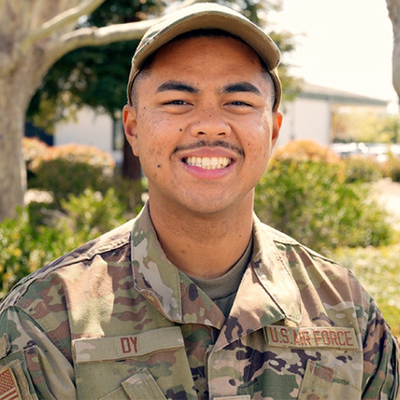Jacques Dy

“I think a lot of people don’t know about the Cambodian genocide,” he said. “Something like 2 million Cambodians were massacred, and I feel very fortunate that my parents escaped that and made their way to America so that my sister and I could live a better life.”
Jacques Dy enlisted in the Air Force Reserves in 2021, shortly after joining Lawrence Livermore National Laboratory (LLNL) as an electronics technologist with the Controls Engineering team at LLNL’s Site 300 Firing Operations.
“A lot of my colleagues at the Lab are veterans and many still serving in the Reserves so I had a lot of support from the Lab when I enlisted,” Dy said. “I joined for the camaraderie and to be a part of something bigger than myself: Site 300 is really focused on teamwork, just like in the Air Force Reserves. In both, I get a great sense of accomplishment when working towards national security and national defense.”
As he prepares for his first deployment, he said he feels ready.
“I have my parents to thank for everything,” Dy said. “The more I understand about what they went through, the stronger I become because I want them to be proud of me and I want them to see how far we’ve come.”
Dy’s parents were born in Cambodia but escaped to Thailand to avoid persecution, then became refugees in the Philippines, and finally the United States. They escaped the systematic killing of Cambodian citizens by the Khmer Rouge, when nearly a quarter of the population was estimated to have died.
“I think a lot of people don’t know about the Cambodian genocide,” he said. “Something like 2 million Cambodians were massacred, and I feel very fortunate that my parents escaped that and made their way to America so that my sister and I could live a better life.”
Dy attributes much of his success to his parents’ perseverance and lessons. Growing up Buddhist, Dy shares that one of the values his parents taught him was humility.
“I try to remember that no single person is more important than anyone else, and definitely not more important than their community,” Dy said. “In the Air Force, we call it being a wingman. There’s this value of looking out for each other and I think that can be applied to any community you’re a part of.”




